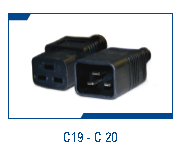Power cords are the unsung heroes of every data center and IT infrastructure setup. Often overlooked, these essential components play a critical role in providing a reliable power connection to various equipment. Whether setting up a new data center or replacing old power cords, making the right choice ensures uninterrupted power supply and equipment performance. This blog will discuss the key factors to consider when selecting power cords, helping you decide on your needs.

- Plug and Connector Type:
One of the primary considerations when choosing a power cord is the type of plug and connector required for your equipment and power outlets. Different regions and countries have varying standards for power plugs and sockets, so it is essential to ensure compatibility. Check the local power requirements and select power cords with the appropriate plug and connector type to ensure a seamless and safe connection.
- Voltage and Amperage Ratings:
Power cords come with specific voltage and amperage ratings; matching these ratings with your equipment’s power requirements is crucial. Power cords with lower voltage or amperage ratings can lead to overheating and potential equipment damage. On the other hand, cords with higher ratings may not fit into the power outlet or the equipment, posing safety hazards. Always verify the voltage and amperage compatibility before making a purchase.
- Cable Length:
The length of the power cord is an essential factor, especially when setting up equipment at a distance from the power source or in a large data center with complex layouts. A cord that is too short might require the use of extension cords, which can be messy and increase the risk of cable clutter. Conversely, excessively long cords may result in power wastage and signal degradation. Measure the distance between your equipment and power source, and select power cords with appropriate lengths to ensure optimal performance and tidiness.
- Cable Gauge:
The cable gauge, known as wire thickness, determines the power-carrying capacity and affects the cord’s efficiency. Thicker cables (lower gauge) can handle higher currents and are suitable for high-power devices, while thinner cables (higher gauge) are more suitable for lower-power devices. Choosing the correct cable gauge prevents overheating and power loss, promoting safety and energy efficiency.
- Cable Material and Quality:
Power cord manufacturers use various materials for cable insulation and jacketing. The quality of these materials impacts the cord’s durability, flexibility, and resistance to environmental factors. Opt for power cords made from high-quality materials, such as PVC, rubber, or thermoplastic, which can withstand wear and tear, temperature fluctuations, and exposure to moisture or chemicals. Investing in quality cords ensures a longer lifespan and reduces the need for frequent replacements.
- Safety Certifications:
Safety should always be a top priority when selecting power cords. Look for cords that have been tested and certified by recognized safety organizations, such as UL (Underwriters Laboratories), CSA (Canadian Standards Association), or VDE (Verband der Elektrotechnik), to meet international safety standards. These certifications guarantee that the cords are manufactured to stringent safety guidelines and have undergone rigorous testing for fire resistance, electrical safety, and overall reliability.
- Environmental Considerations:
For data centers and businesses striving to adopt eco-friendly practices, choosing power cords with environmental considerations is essential. Energy-efficient power cords can reduce electricity consumption, operational costs, and carbon footprint. Additionally, some manufacturers offer recyclable or RoHS-compliant (Restriction of Hazardous Substances) power cords, which are safer for the environment and human health.
- Compatibility with Equipment:
Each piece of equipment in a data center might have specific power input requirements. Ensure that the power cords you choose are compatible with all the devices they are intended to power. Compatibility issues can lead to reduced efficiency, equipment malfunctions, or even damage to the connected devices.
- Brand Reputation and Support:
When choosing power cords, consider the reputation of the manufacturer. Established power cord manufacturers with a history of producing reliable products will likely offer better customer support and warranties. Buying from reputable brands ensures you receive a quality product and prompt assistance if you encounter any issues.
Conclusion:
The right power cord is essential for maintaining a stable and efficient IT infrastructure. Factors such as plug and connector type, voltage and amperage ratings, cable length, gauge, material quality, safety certifications, environmental impact, equipment compatibility, and brand reputation can help you make an informed decision. At Netrack India, we understand the importance of reliable power cords in data centers, and our range of power solutions is designed to meet the highest industry standards. Our power cord manufacturers prioritize safety, durability, and energy efficiency, ensuring seamless power distribution for your x`x`qx equipment. Choose Netrack India for power cords that provide unparalleled performance and peace of mind.



























